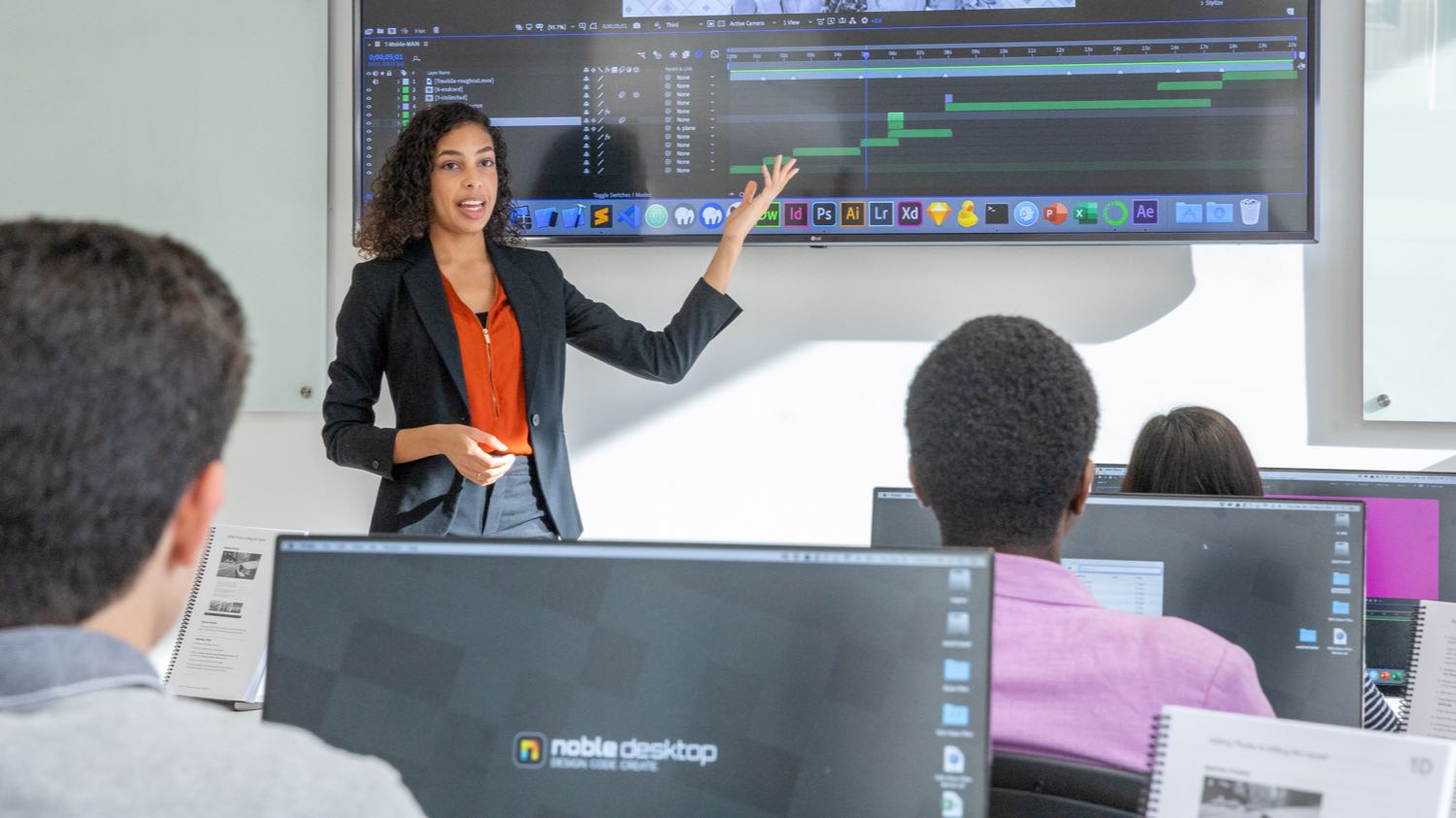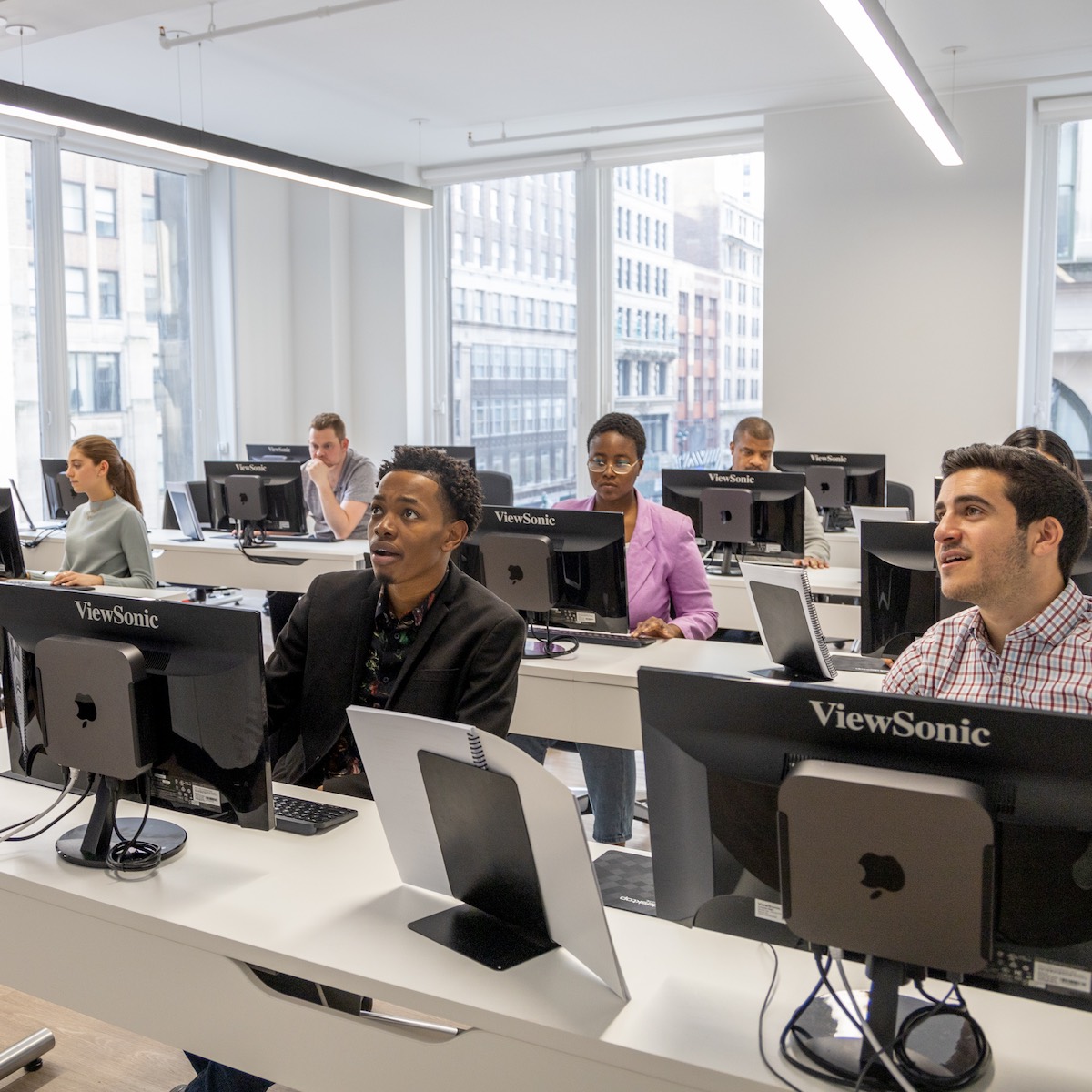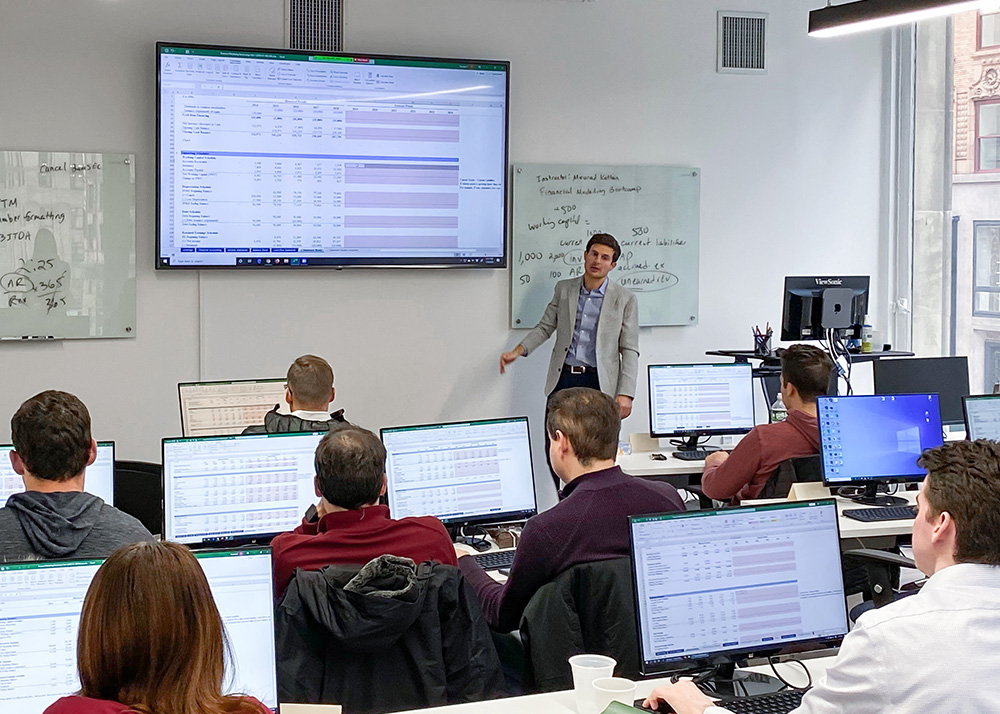What is Computer Science?
Computer Science is a field that focuses on computers and computer-related systems. As one of the broader fields in technology, it encompasses several subcategories like software engineering, computer networking, and artificial intelligence. Software development, or the design and maintenance of software applications, is a large part of this field alongside computer graphics, programming languages, and data science. Those who work in computer science are referred to as computer scientists and use the help of tools, platforms, and software systems to solve problems, automate tasks, and improve the efficiency of computer systems in various industries. Computer scientists collaborate with professionals in other science, technology, engineering, and math (STEM) fields to help advance technology overall, and it plays a vital role in the development of our digital world. It is a great subject to consider for those who have a particular interest in computer systems.
The history of computer science dates back to the 1840s with the first computer programmer, an English mathematician named Ada Lovelace. Ada worked on many technological projects, including a translation project during which she began to envision a general-use machine that could take simple commands and help problem-solve. By the late 1800s, a man named Herman Hollerith had created an electrical punch card system that was used to process the data from the US Census, becoming an early predecessor to data processing for computers. From there, technology began to develop at a rapid pace. Computational Science as a field was developed in the mid-1900s with Alan Turing’s automatic machine, also known as the Turing Machine. These machines were created to discover the limitations of what can be computed. Years later, the late 1900s saw the rise of computers as a staple of our society. The creation of the first Computer Science department happened in 1960 at Purdue University. Though programming languages had been conceptualized and put to use since the years of Ada Lovelace, they flourished as technology became more prevalent, and by 1995, many of today’s most popular and expansive programming languages had been created and were being used for projects like building software applications, managing databases, and powering the internet.
Computer Science has continued to evolve through the 21st century. Today, computer science is wrapped up in nearly every aspect of modern life. It has many branches and is vital to many fields and industries, some of which include data science, machine learning, and artificial intelligence. Computer science is not just about coding and programming. It requires a lot of problem-solving and creativity. Whether you’re a highly creative or a highly technical person, there are branches of computer science that will match your interest. There is also the additional benefit of knowing that Computer and Information Technology are growing fields, expected to add new jobs to the economy over the coming decades, and boasting a larger salary than a majority of other fields. In our technology-dominated world, there is no shortage of unique jobs that fall under the umbrella of Technology. Join us as we walk you through why learning Computer Science can help amplify your future opportunities.
Why Learn Computer Science?
Learning computer science is more than just understanding the basics of computers. If you want to be successful in this field, you must have a deep and working knowledge of how technology impacts society as a whole. There are many reasons to learn computer science, but chief among them is the opportunity to grow important soft skills that will help you in any industry. For instance, knowing how to analyze problems and find practical and appropriate solutions is an incredibly valuable skill. Computer science encourages you to think critically about situations and break them down into smaller elements that are easier to manage. This field also improves your handle on collaboration. Most jobs require an element of teamwork to accomplish goals. Computer Science, especially in the form of bootcamps, certificate programs, and courses, allows you to contribute to hands-on projects and activities that encourage working with others. These are not the only soft skills you’ll learn in computer science. There is a long list of things you’ll learn that are applicable in other fields.
Computer Science skills can also be used in a diverse range of industries. Though it may seem like this field is strictly related to technology, that couldn’t be further from the truth. Computer science integrates with some of the world’s largest interdisciplinary fields. Take Data Science, for example. This field draws from Computer Science and is used in everything, from small business decisions to building chatbots for agencies. Computer scientists work on the same projects. There is a lot of overlap between the two industries, and without computer science, data science would not be the field it is today. Computer science is not strictly used in technology management. It has a wide reach for the way it impacts different industries and is a reliable point of reference for other prominent fields like artificial intelligence, game design, web development, and even entertainment. The job market for computer science graduates is incredibly diverse, and as technology continues to advance, different sectors can find unique ways to use those skills to better themselves and their prospects.
Computer science does have its value in personal projects, as well. From managing finances to automating everyday tasks, you can simplify life when you are proficient in this field. Learning computer science will allow you to use technology in a way that improves your efficiency, productivity, and creativity. These personal projects are not only valuable in navigating your daily lives, but these projects become a great addition to professional portfolios later on down the line. Whether you’re a hobbyist who’s working with coding projects for the first time or a proficient computer scientist who is looking to use their skills to enhance your day-to-day processes, the knowledge gained from studying this field can change your life. Computer science isn’t just a professional tool for the technological sector. It has long since become a means to make personal improvements in today’s digital age.
What Will You Learn in a Computer Science Summer Program
A computer science program will often start with basic technical skills. Computer programming, or the study and creation of code that provides computers with tasks and instructions, is important in computer science. Coding and programming languages are central to working with computers. A computer science course often introduces you to at least one programming language, like C++, Java, or Python. Computer science programs also cover application and system software. While system software runs the computer's hardware, application software is used to carry out tasks that are not directly related to the operation of a computer itself, and both are important to the way a computer runs. Data management is considered an important skill in the development of Information Technology (IT) systems. Institutions rely on data management for effective decision-making with the help of collected, organized, and managed data. Front-end, Back-end, and Full-stack web development are common topics in computer science and involve the development of internet-based applications like websites and social networking services.
There are also many soft skills that you can learn. Since soft skills are important in any professional role, delving into computer science can be beneficial regardless of your overarching career goals. Problem-solving is a big part of this field. Programs will cover analytical approaches to complex computer-related issues, and give you hands-on experience with solving them. This can give you more insight on how to adapt to certain situations, and how to efficiently and effectively identify issues and provide appropriate solutions to them. Once you have experience with computer science, you may notice your communication changing. Programs can help you share complicated ideas in digestible ways, and communicate better with others. This ties into improved creativity, as you often have to delve deep to come up with innovative solutions to some of the technology-related problems that might spring up. Whether explicitly covered, or learned in passing through project-based activities and real-world case studies, your time management and teamwork will also grow.
These programs provide opportunities for specialization. Suppose you pick a program with a concentration in a specific computer science-related field, such as artificial intelligence, data science, or cybersecurity. In that case, you can learn skills that are specific to that field. In a computer science course focused on artificial intelligence, you may be introduced to machine learning and natural language processes. In data science, you may review Big Data and statistics. In cybersecurity, your instructor might focus on software testing or cryptography. Because computer science has such a wide range of functionality, you can explore the connection between this field and other fields quite easily, while also picking up highly specialized knowledge based on your interests.
What Can You Do with Computer Science Training
If you enjoy working with computers, getting hands-on experience before joining the professional workforce can be a plus. Once you have a degree, certificate, or other formal training, you can join several prominent careers. In Information technology, that might look like a job in data science, cybersecurity, artificial intelligence, and user experience (UX) or user interface (UI). In engineering, that might look like a job in software engineering, or site reliability engineering. In data and research, you may find yourself filling roles as a computer and information research scientist, an information security analyst, or a software quality assurance analyst. The most common computer science jobs include software developers and web developers. There are many additional roles outside of these that are directly related to computer science, and while some of these may require additional or specialized training, there is often an overlap in the basics that can be learned through this field.
In many higher education institutes, computer science is a degree. However, some other degrees that are closely related to computer science might better align with your interests. Information Technology, Cybersecurity, and Network Administration are familiar fields that depend on computer science but have their own degrees. Other potential majors include Software Engineering, Computer Information Systems, and Web Development. These fields of study are technology-centered and are in high demand as they are each part of growing industries that rely on computers. Once you have proficiency in computer science or a computer science-related degree, you can begin work on special projects like analyzing computer systems and programs, designing computer-based systems using math, algorithms, and theories, and using computing solutions to solve problems in a variety of industries.
Advantages of a Computer Science Summer Program
With the importance of computer science in today’s market, joining a computer science summer program can give you the jump you need to gain immersive, professional experience before graduating high school or settling on a college degree. A summer program is a comprehensive way to learn the fundamentals of the field while participating in engaging opportunities. It is the perfect way to build up experience without being a full-blown professional. Because summer programs are traditionally shorter than the semester-long courses you may find in school, they are an efficient way to learn a subject and can offer cutting-edge technologies at no extra expense to you. The skills gained in a summer program are applicable in a professional setting later on down the line. Completing a course can provide you with a certificate that can be used on your professional portfolio, social media, or personal statements. This can make a world of difference in everything from college to job applications. With the help of industry insight, this can also provide you with context for which tech careers and university paths might closely align with your overall interests, ensuring that you join a field that’s right for you.
Another benefit to joining a computer science program is the opportunity to build a strong network of peers and mentors. Summer programs are rich with collaborative opportunities, and instructors will often provide guest speakers, unique trips to local institutions, and internships or other opportunities that are specific to your program. You can work with students from across the globe. Summer programs often attract visitors from all over the world, and your cohort of students may boast a few international participants, which helps in broadening your views and learning problem-solving tips and tricks from around the world. As you learn more technical skills, a supportive community of like-minded individuals can make a huge difference in your success. Having direct guidance from professionals who have worked in computer science will offer valuable insights into industry trends, best practices, and career paths. A summer program is the perfect time to refine your goals and form lasting connections.
Best Computer Science Summer Programs for High School Students
If you’re in search of a comprehensive computer science course that is offered both in-person and live online, consider NextGen Bootcamp’s Computer Science Summer Program. Not only will you learn two of the most popular programming languages, Java and Python, but you’ll also learn the fundamentals of data science. The curriculum for this course is unique and covers how to clean, wrangle, and visualize complex data. You will also learn how to write a program and read and understand large programs. With the help of industry professionals, this course can efficiently teach you how to use two of technology’s biggest languages to quickly grasp the core concepts needed to be successful in computer science. The class sizes are small which allows more individualized attention and connection with instructors. Upon graduation, all participants will receive a verified certificate of completion that can be used in professional portfolios, social media, and official documents.
Another available option is Berkeley’s Summer Computer Science Academy. This program is for teens aged 16-17 who are highly interested in computer science and want to prepare for higher education in this field. This is a beginner course and is based on the same curriculum that undergraduates at the university take. Through a series of daily coding challenges, students will learn more about core concepts in computer science, including computing and coding languages and programming projects that are aligned directly with the student’s interests. Some specific topics covered in this course include the social implications of computing, algorithms, number representation, abstraction, functions, and boolean logic and conditionals. By the end of the course, students will have an opportunity to share their individual or group programming project with university faculty and instructors, who will give feedback and ask questions about the student's work. This acts as an interactive, network-building opportunity.
Carnegie Mellon hosts a CS Scholars program for rising high school juniors who are looking to gain higher education experience in computer science before taking the plunge into a degree track. With the help of faculty-led lectures and hands-on research projects, students will learn the core elements of programming and problem-solving in Python. Participants will also improve their computation skills, with a specific focus on the role of math in computer processing. This course covers algorithmic components, basic data structures, and general problem-solving techniques. At the end of the course, students will work on a group project that allows them to apply their skills to real-world challenges. CMU faculty and other industry leaders are available for not only mentorship but feedback, to help build connections and support students through their computer science journey.
The University of California (UCLA) offers a Computer Science Introductory Track that combines a coding bootcamp with lab touring and UCLA coursework to fully introduce students to the field of computer science. This course focuses on using computers as a problem-solving tool and exploring the design of computer programs to learn how they are effectively implemented. A few of the topics covered in this course include control structures, conditionals and loops, and functional decomposition. This is a beginner course, and intermediate options exist for those who are already well-versed in Python and other basic programming skills. By the time students leave this course, they will have a stronger understanding of the work associated with a degree track in computer science or a similar technology-related field.













